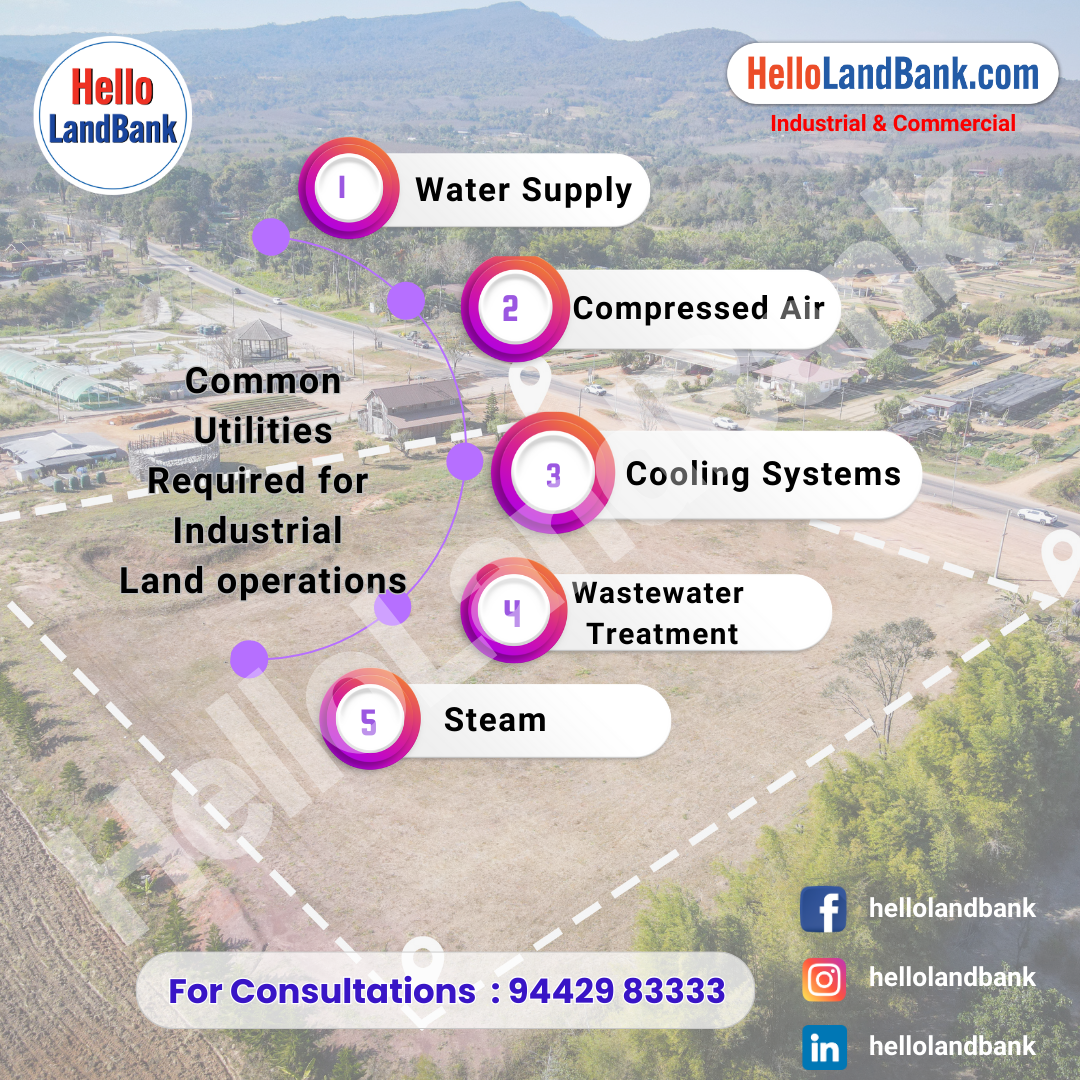Industrial land operations typically require a range of utilities to support manufacturing processes, facility operations, employee amenities, and infrastructure needs. The specific utilities required may vary depending on the type of industrial activities, facility requirements, and regulatory standards. However, common utilities required for industrial land operations include:
1. Electricity:
- Electricity is essential for powering industrial machinery, equipment, lighting systems, HVAC systems, and electrical appliances used in manufacturing processes, production lines, and facility operations.
- Industrial facilities often require high-capacity electrical systems, three-phase power, transformers, and backup generators to ensure reliable and uninterrupted power supply.
2. Water Supply:
- Water supply is necessary for various industrial processes, cooling systems, sanitation, and employee amenities within industrial facilities.
- Industrial operations may require potable water for drinking, process water for manufacturing processes, and wastewater treatment systems to manage industrial effluents and discharge compliance with environmental regulations.
3. Natural Gas:
- Natural gas is commonly used as a fuel source for heating, steam generation, thermal processing, and combustion processes in industrial facilities.
- Industrial boilers, furnaces, heaters, and thermal equipment may require natural gas supply for energy-intensive operations, such as metal smelting, chemical processing, and heat treatment.
4. Compressed Air:
- Compressed air is a versatile utility used for pneumatic tools, air-powered machinery, control systems, and industrial processes requiring pressurized air.
- Industrial compressors, air receivers, and distribution systems deliver compressed air to various points of use within the facility for power transmission, actuation, and process control.
5. Steam:
- Steam is utilized for heating, sterilization, cleaning, and process heating applications in various industrial sectors, including food processing, pharmaceuticals, textiles, and paper manufacturing.
- Industrial boilers, steam generators, and steam distribution networks deliver high-pressure steam to support steam-driven processes and thermal energy requirements.
6. Cooling Systems:
- Cooling systems are essential for controlling temperatures, dissipating heat, and maintaining optimal operating conditions in industrial processes, equipment, and facilities.
- Industrial chillers, cooling towers, refrigeration systems, and HVAC systems provide cooling capacity for process cooling, air conditioning, and heat removal in industrial environments.
7. Wastewater Treatment:
- Wastewater treatment facilities are necessary to manage industrial effluents, process wastewater, and stormwater runoff generated during industrial operations.
- Industrial wastewater treatment systems, including settling tanks, filtration systems, biological treatment units, and chemical treatment processes, remove contaminants and pollutants from wastewater before discharge or reuse.
8. Telecommunications:
- Telecommunications infrastructure, including telephone lines, internet connectivity, and data networks, supports communication, data exchange, and information technology (IT) systems within industrial facilities.
- Industrial operations may require high-speed internet access, data connectivity, and wireless networks for remote monitoring, control systems, and digital communications.
9. Fire Protection Systems:
- Fire protection systems, including fire sprinklers, fire alarms, smoke detectors, and fire suppression systems, are essential for safeguarding industrial facilities, equipment, and personnel against fire hazards and emergencies.
- Industrial fire protection systems are designed to detect, suppress, and control fires to minimize property damage, ensure life safety, and comply with fire safety regulations.
10. Waste Management:
- Waste management infrastructure, including waste bins, recycling facilities, hazardous waste storage areas, and disposal systems, are necessary to manage solid waste, recyclables, and hazardous materials generated during industrial operations.
- Industrial facilities must implement waste management practices to minimize environmental impact, comply with waste regulations, and promote sustainability.
By providing these essential utilities, industrial land developers, property owners, and operators can support efficient operations, enhance productivity, ensure regulatory compliance, and create conducive environments for industrial activities and business growth.




